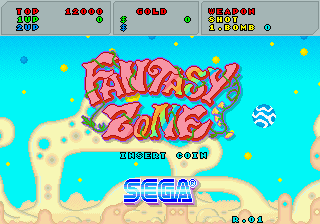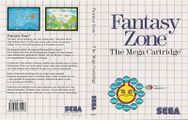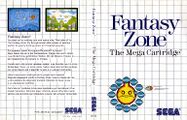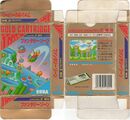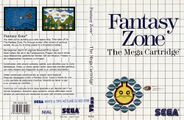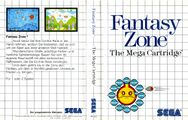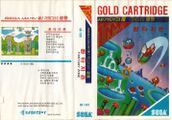Fantasy Zone
From Sega Retro
| Fantasy Zone | |||||||||||||
|---|---|---|---|---|---|---|---|---|---|---|---|---|---|
| System(s): Sega System 16, MSX, Nintendo Famicom, Nintendo Entertainment System, TurboGrafx-16, Sega Master System, Sharp MZ, Sharp X68000, Virtual Console | |||||||||||||
| Publisher: Sega, Dempa, Sunsoft Tengen US NEC JP NEC Avenue | |||||||||||||
| Developer: Sega, Dempa, Sunsoft Pixel Bits Laboratory | |||||||||||||
| Genre: Shoot-'em-Up | |||||||||||||
| |||||||||||||
|
CERO
Missing Parameter! |
Fantasy Zone (ファンタジーゾーン) is a side-scrolling shoot-'em-up by Sega, originally released in 1986 for Sega System 16 arcade hardware. It is the first entry in the Fantasy Zone series, a franchise that would be supported by the company in the late 1980s but largely abandoned by the mid-1990s.
Fantasy Zone stars the sentient being "Opa-Opa", a spaceship tasked with saving the "Fantasy Zone" from an army of invaders orchestrated by an unknown force. It is similar to Williams' 1980 arcade game Defender, in that the player can move both left and right across an endlessly repeating playfield, though makes a number of changes and additions to keep the game unique. Rather than simply destroying enemies, Opa-Opa has to eliminate eight "bases" across each level before being presented with an end boss, where horizontal scrolling is clamped.
Opa-Opa has two firing modes - a pair of twin lasers which fire ahead, and a bomb which curves downwards to hit ground targets. Weapons and engines can be upgraded through the use of in-game shops, represented by balloons which appear at the start of the level. Yellow balloons also allow the player to switch weapons, assuming they have bought more than one.
Unusually for shoot-'em-ups of the time, Fantasy Zone opted for vibrant pastel-coloured worlds and joyful music rather than the traditional "space" setting of previous attempts. It is often dubbed as the first "cute-'em-up" as a result. Despite this, Fantasy Zone is known for being an extremely difficult game, as the slow moving camera and swarms of enemies quickly lead to "bullet hell" scenarios.
Contents
Sequels and Re-releases
Fantasy Zone was popular enough to see several ports to home consoles, though most remained exclusive to Japan. The watered down Sega Master System port is perhaps the most famous, as Fantasy Zone was one of the console's most highly rated games. Two of the more processor-intensive bosses were replaced in the SMS version - Dolimicca's boss, which now resembles a fish, and Mockstar's which resembles a turtle. The Master System version has since been released for the Wii's Virtual Console service.
Sega would later release a near-perfect port of the game for Japanese Sega Saturns. The Saturn port has a karaoke mode, with vocals added to the tracks, and a replay mode.
The game was ported to non-Sega consoles too. MSX, Sharp X68000 and TurboGrafx-16 ports were handled by Pony Canyon, Dempa and NEC Avenue respectively. The game was brought to Nintendo's Famicom by Sunsoft, but strangely Tengen also ported it to the NES for sale in North America. The Famicom and NES ports are both different, despite being made for what is essentially the same console. Previously, Tengen merely edited the Sunsoft versions and released the edited ROMs overseas; this may hve had something to do with the decision to make Fantasy Zone from scratch. Nevertheless, both ports were done by Japanese compnies (Tengen contracting to a group called Pixel, who outsourced (parts of?) the sound to Masaharu Iwata).
Most home ports of Fantasy Zone greatly reduce the quality of the graphics, going so far as to remove backgrounds from boss fights altogether. The Master System version also removes the "radar", allowing the user to see where bases are placed on the map. Others, such as the NES port, reduce the number of bases in across the level, and drop the number of enemies in order to maintain a decent framerate.
The Sharp X68000 port, however, is almost perfect, and is also notable for devoting a secret stage to Space Harrier (also set in the "fantasy zone"). Contrary to popular belief, the Game Gear game often known by the same name is a completely different game.
The game was re-released twice as part of the PlayStation 2's Sega Ages 2500 series in Japan. Volume #3 of the series sees a remastered Fantasy Zone with 3D modes and four extra levels. This version was brought to the western world through Sega Classics Collection. It was later included in Volume #33 of the same series, along with the rest of the franchise, as part of Fantasy Zone Complete Collection. This version also includes an enhanced version of the Sunsoft Famicom port, named Fantasy Zone Neo Classic.
Fantasy Zone was followed by Fantasy Zone II: The Tears of Opa-Opa, a similar game which was not released in arcades.
Enemies
Stages
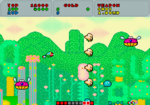 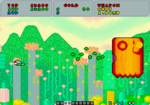 |
Plaleaf (Planet of Greenery)
Long ago, far away in space there existed a "fantasy zone" where a couragous hero called Opa-Opa (the player) fought in a valiant cause to rescue the "fantasy zone" from its enemies. Plaleaf is the easiest stage of the game, and so shouldn't put up much of a challenge. Compared to later levels, the amount of enemies on screen is small (and most follow set patterns, so they can easily be avoided), so a decent player shouldn't need any upgrades to succeed. The boss, is also fairly simple. It tries to lock on to your Y position and fires a flurry of green bullets at you, though watch out as they sometimes rebound of the left hand side of the screen too. The weak point is the mouth. Enemies seen in this level include Moocolon, Quili-Quili, Sourtham, Bottaco and Thaya-Thaya. |
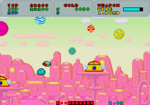 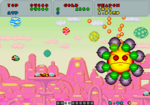 |
Tabas (Planet of Fire)
Tabas predictably ups the difficulty, though can just about be overcome without spending money on weapon upgrades. The boss, regularly featured in cover artwork, does require some skill to overcome, however. It attacks Opa-Opa by erupting, causing fireballs to rain down on the player. Luckily, everything is a target, so the only concern is dodging the attack. Enemies seen in this level include C-Soul, Botelynn, Asworm, Chamba and Coulon. |
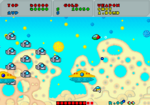 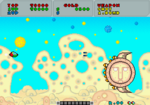 |
La Dune (Planet of Sand)
By this point, the game will start to crush novice players, as the number of enemies vastly stats to increase. It marks the introduction of the "Goro" enemy - one that locks onto your screen position and will keep firing at you until you destroy it. This means, unlike previous stages, you can't run away from your problems in the hopes they'll disappear while off-screen. La Dune's boss can also be tricky. The player needs to destroy each of the laser cannons located on the left hand side, though once most of them are out of the way, the boss will start to chase you. Predictably you have a much higher chance of survival if you've upgraded your engines at this point. Enemies seen in this level include Goro, Pata, Onyamma, Bont and Poyon. |
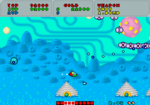 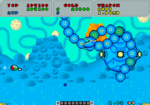 |
Dolimicca (Super Planet)
Dolimicca is, surprisingly, an easier stage than La Dune, thanks to its decision to put all of its bases on the ground. This means if you arm yourself with the right weapon, you can scoot along the floor and wipe out several bases very quickly. That being said, the game still throws out a number of tricky enemies that you'll need to deal with, and by now, everything will start firing at you. Dolimicca's boss is a typical "bullet hell" opponent. Opa-Opa has to destroy both arms, which swing about launching bullets all over the screen. Much like Tabas, the trick is to avoid enemy fire rather than concentrating shots, though the boss' body is invulnerable to attack. Enemies seen in this level include Shatboo, F-Zab, Squel and Floweye. |
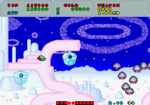 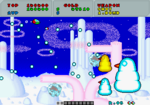 |
Polaria (Planet of Ice)
Polaria is a typical ice stage, and packs on even more pressure to assure the player runs out of lives. It's more masses of bullets when it comes to the boss, which consists of various different sizes of snowman. You have to destroy each column in order, starting with the smallest, though as you progress, the size of the bullets also increases. Enemies seen in this level include Jerry and M.F. Sourtham, Bont and Coulon also return. |
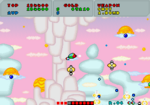 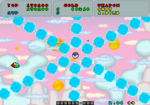 |
Mockstar (Planet of Clouds)
There's nothing particularly remarkable about any of the later stages in Fantasy Zone - they just throw out different assortments of enemies. By this point, the player will suffer if he or she has not upgraded their engine. Mockstar's boss is perhaps the cheapest in the game, as it comes into view from six different angles, increasing the chance of you being destroyed before you've even seen what's going on. The objective is to shoot the eye while it spins around at increasing speeds. On a side note, the music played on Mockstar's stage is used in Sonic & Sega All-Stars Racing, as Opa-Opa's "All-Star" theme. The only new enemy to be introduced is Billian. The rest, Jerry, Asworm, Botellyn, and Squel, come from earlier levels. |
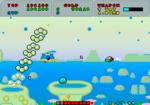 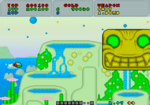 |
Pocarius (Planet of Water)
Though it appears to be more inviting, Pocarius is the hardest level in the game. It becomes impossible for the average man to avoid the number of bullets, even if the arcade operator has put the game on "easy mode". If by chance the player does succeed, he or she will be greeted by one of the hardest bosses. Though it doesn't attack, it will attempt to teleport on top of Opa-Opa, which means it's a case of "avoid, shoot, avoid, shoot". But once again, speed is proportional to damage, so in order to overcome this one you need fast reactions and the ability to fire rapidly. On a home system, it's the perfect example of how a turbo controller could come in handy. Recal is introduced as an enemy here, though C-Soul, Pata, Poyon and M.F. also return. |
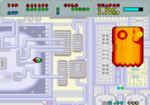 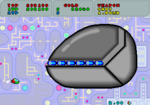 |
Salfar (Planet of Evil Spirits)
The final stage, Salfar as Opa-Opa duel with all the bosses he has encountered in the game so far, before the final showdown with the end boss. It's the only stage in the game that forces you to enter the shop - a smart idea as it's the last chance you'll get to use it. |
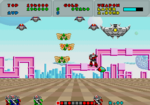 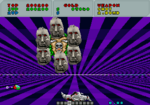 |
Dragon Land
Dragon Land is a secret stage, exclusive to the Sharp X68000 version of the game. To access it, the bases in Plaleaf need to be attacked and destroyed in a certain order (from left to right, according to their positions on the radar). Doing so will drop the letters "H", "A", "R", "R", "I", "E", and "R", and when collected you'll be taken to this stage after Pocarius. Dragon Land is based on Space Harrier, and features enemies, music and a boss from that game (though everything is altered to work with Fantasy Zone's sideways perspective. |
| Dawndusk
The PlayStation 2 version of the game (Sega Ages 2500 volume #3 and Sega Classics Collection) adds four more levels. This is the first, which counts as round 8. | |
| Apochal
Also a PlayStation 2 exclusive. This level is built similarly to Dolminicca, in that all the bases are on the ground. The boss is a circular being which fires in a number of directions, though each of its initial bullets split into four (and as it becomes more damaged, eight). | |
| Cavian
Also a PlayStation 2 exclusive. | |
| Depooble
Also a PlayStation 2 exclusive, set underwater. The boss is similar to that of Pocarius, with a bit of Tabas' boss thrown in. |
Production Credits
Master System Version
Programmed by: Dunk Asi 12, Sexy Bomb, Asc03458
Designed by: Matilda Yoko, Mayu, Choko, Aya
Music by: Noah Toku
Directed by: Warlock Mut 241
Special Thanks to: Ici, Ktg, Ken, Hiro
Produced by: Sega
Famicom Version
Program: M.Nomura, A.T, Mac, S.Yamada, K.Ishihara
Design: Kaz.Sugiura, K.Sakoh, Y.Iwata, H.Kagoya
Sound: N.Morota
Special Thanks: K.Sada, N.Kodawa
Directer: K.Yoshida
Presented by: Sunsoft
Physical Scans
Master System version
| Sega Retro Average | |||||||||||||||||||||||||||||||||||||||||||||||||||||||||||||||||||||||||||||||
|---|---|---|---|---|---|---|---|---|---|---|---|---|---|---|---|---|---|---|---|---|---|---|---|---|---|---|---|---|---|---|---|---|---|---|---|---|---|---|---|---|---|---|---|---|---|---|---|---|---|---|---|---|---|---|---|---|---|---|---|---|---|---|---|---|---|---|---|---|---|---|---|---|---|---|---|---|---|---|---|
|
| 86 | |
|---|---|
| Based on 15 reviews | |
MSX Version
NES Version
Sharp MZ Version
| Sharp MZ, JP |
|---|
|
Sharp X68000 Version
TurboGrafx-16 Version
| TurboGrafx-16, US |
|---|
| <div style="margin:auto; max-width:Expression error: Unexpected < operator.px">
320x120px Cover
|
| TurboGrafx-16, JP |
|---|
| <div style="margin:auto; max-width:Expression error: Unexpected < operator.px">
320x80px Cover
|
50x50px HuCard |
External Links
- ↑ Complete Guide to Consoles, "" (UK; 1989-10-16), page 55
- ↑ Complete Guide to Consoles, "Volume IV" (UK; 1990-11-xx), page 96
- ↑ The Complete Guide to Sega, "" (UK; 1991-05-xx), page 56
- ↑ Computer Action, "Juli/August 89" (DK; 1989-0x-xx), page 36
- ↑ Console XS, "June/July 1992" (UK; 1992-04-23), page 140
- ↑ Computer & Video Games, "May 1988" (UK; 1988-04-15), page 123
- ↑ Game Mania, "May 1993" (UK; 1993-xx-xx), page 81
- ↑ Mean Machines Sega, "October 1992" (UK; 1992-09-xx), page 133
- ↑ S: The Sega Magazine, "July 1990" (UK; 1990-06-07), page 12
- ↑ S: The Sega Magazine, "August 1990" (UK; 1990-07-05), page 11
- ↑ Sega Power, "October 1991" (UK; 1991-09-05), page 56
- ↑ Sega Pro, "December 1991" (UK; 1991-11-21), page 57
- ↑ Sega Pro, "April 1993" (UK; 1993-03-11), page 70
- ↑ Tilt, "Décembre 1987" (FR; 1987-1x-xx), page 100
- ↑ Video Games, "7/93" (DE; 1993-06-30), page 100
- No players field
- NES games
- Old content rating field
- Use romtable template
- All games
- Old-style rating (cvg)
- Old-style rating (segapower)
- Rating without PDF source
- Old-style rating (segapro)
- Update ratings template
- 3 old ratings
- Pages with broken file links
- Fantasy Zone (franchise)
- 1986 System 16 games
- System 16 games
- Mega-Tech games
